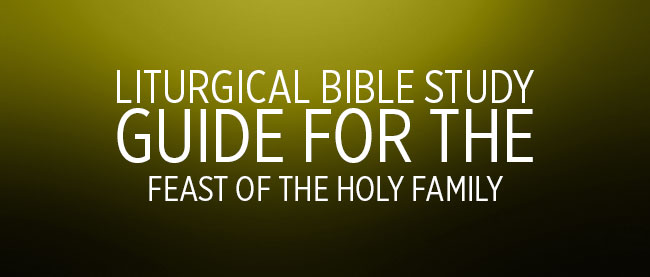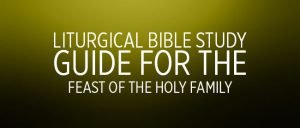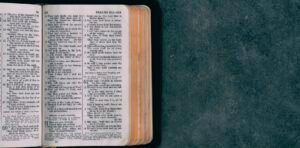Introduction
The Feast of the Holy Family honors the family group of Jesus, Mary and Joseph. This feast developed only in the 17th century. Built on the Gospel accounts, this family is looked upon as an excellent domestic unit representing the ideal family life. To promote family life and build up devotion to the Holy Family, a feast was established for the Universal Church in 1921 (under Pope Benedict XV), and it is currently celebrated on the Sunday after Christmas or on December 30th when Christmas falls on Sunday. There is an optional set of readings for the 1st and 2nd Readings, both are presented here.
Gospel – Luke 2:41-52
Nothing brings a family closer together than a crisis, especially a crisis which involves a child who is lost. Today we hear of such a crisis involving the Holy Family as we hear of the finding in the Temple. This is an event which is reported only by St. Luke; a mystery which we celebrate as the fifth joyful mystery of the rosary.
1st Reading – Sirach 3:2-7, 12-14
Israelite wisdom, like the wisdom of other peoples, was the product of the scribal schools and the scribal class; this class first appeared under the monarchy and followed Egyptian models in administration and procedure. Wisdom is gained by counsel and instruction (Proverbs 1:5; 12:15; 13:14; 19:20f), and the young man is frequently admonished to accept instruction. Wisdom comes from association with the wise (Proverbs 13:20). The tradition of wisdom begins with primordial man (Ezekiel 28:12). The wise man accepts correction and instruction (Proverbs 9:8ff; 21:11); he is always learning, where the fool refuses to learn.
Israelite wisdom was modified by its relation to faith in Yahweh, which gives it a character of its own. Both Egypt and Mesopotamia had gods who were venerated for their wisdom, but these gods were specialists. Yahweh alone is truly wise; His wisdom is exhibited in creation (Proverbs 3:19; Job 38- 39).
Wisdom is a treasure which men cannot discover, for it is found only with God, who grants it to men. The wisdom of God is seen not only in His creation but in His management of human history (Job 12:13). Wisdom, while learned from tradition, is ultimately a gift of Yahweh (Proverbs 2:6).
The wisdom literature alone in the Old Testament directs attention explicitly to the problems of the individual person; it is free of peculiarly national traits and of messianism. Its merit is that it does draw attention to the importance of the business of daily life of the man who is not very important, and its emphasis on the fact that life is unity and integrity which must be preserved from the disintegration of folly is not misplaced.
Today we hear Sirach tell us that fidelity to parents (the 4th commandment) is fidelity to Yahweh.
Optional 1st Reading – 1 Samuel 1:20-22, 24-28
The main purpose of 1st and 2nd Samuel is to provide a history of the foundation of the kingdom of Israel and the settlement of the throne on David and his line. At the end of the book of Judges it is clear that the people see a monarchy as the only way out of a situation of internal strife and anarchy. Outside enemies have been reduced to one, the Philistines, who live along the Mediterranean coast; but they are so powerful and aggressive that the very survival of Israel seems to be in doubt if the tribes don’t unite under a common leader.
Samuel is regarded as the last of the Judges and was the man chosen to bring about this unification. God uses him to anoint Saul as the first king of Israel and later, to anoint David as Saul’s successor.
In our first reading today we hear of Samuel’s birth and dedication. This dedication took place at Shiloh where the ark of the covenant was until King David brought it to Jerusalem.
2nd Reading – Hebrews 10:5-10
The purpose of Colossians was to bolster the faith of the community and correct errors reported about the church in Colossae. False teachers are at work in the community and since these false teachers are charged with “not holding to the head”, the errors must have arisen within the community. Jewish and pagan elements seem to be interwoven. The Jewish influence is evident in the references to observing suggested days, season, circumcision, and other Jewish practices (Colossians 2:16-17). In some circles of Judaism there was a strong belief in the mediatorship and power of the angels. The Qumran community attached a great deal of importance to the angel’s names and their roles in the affairs of the world.
The pagan influences at work in Colossae are reflected in beliefs that certain “elements of the world” or angelic beings were in control of the universe (Colossians 2:8,20). These “elements of the world” were a series of intermediaries between God and the universe. Each was considered to contain part of the “fullness of the Godhead” (Colossians 1:19; 2:9). They were the cause of creation (Colossians 1:15-17). They also shared control over various areas of the earth and over the destinies of men.
Paul had to counter the dangerous tendencies by pointing out the all-sufficiency of Christ in His role in the universe. He had to point out that the “fullness of the Godhead” was not shared by a multitude of intermediaries: all the fullness of God and His power was in Christ himself (1:19; 2:3,9). By His death on the cross, Christ had won a victory over all the forces that were considered to control the universe. In Old Testament wisdom literature Paul found proof that the whole universe had been created and directed by the wisdom of God from the beginning; now this wisdom had been fully revealed in Christ (Colossians 1:15-20).
In our reading today we hear Paul tell us some of the general principles for a life in Christ.
Optional 2nd Reading – 1 John 3:1-2, 21-24
The first letter of John is believed to have been written sometime between A.D. 57 and 62 from Ephesus. Although there is no opening greeting or signature, Saint John’s authorship is apparent from the content. In fact, the letter has very much the same tone as the fourth gospel and has even been described as a sort of introduction to it. The essence of this letter deals with the love of God and of the brethren which are the hallmark of the Christian. Saint Jerome tells us that when John was a very old man his only message was “little children, love one another.” And when his disciples asked him why he was always saying the same thing he always replied, “My children, this is what the Lord commands; if we do this, nothing else is necessary.”





